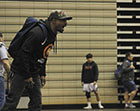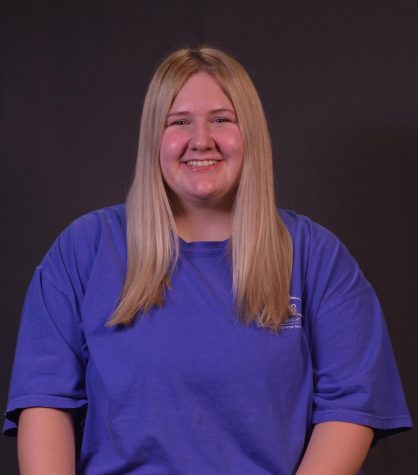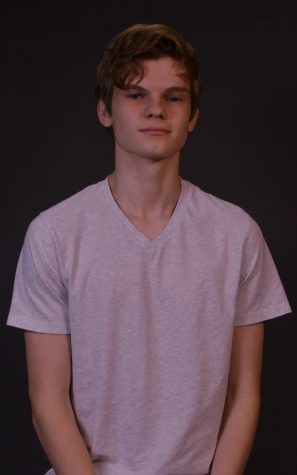On the rise: Local wrestlers take their skills to the next level

Photo by Provided by Nick Hull
Hull coaching at a tournament. He’s been associated with LOG for three-four years. coaching at a tournament. He’s been associated with LOG for three-four years.
May 19, 2021
Giving your all in the form of blood, sweat, and tears. Mental fortitude. Killer instinct. These are the attributes used to describe the best athletes in the world, and they specifically go hand in hand with success in the sport of wrestling. There’s an old saying by world-renowned wrestling coach Dan Gable that says, “Once you’ve wrestled, everything else in life comes easy.” Local students with a passion for the sport that burns like a bright light embrace this saying through their involvement in the Legends Of Gold Wrestling Club.
Legends of Gold (LOG), an Olympic Developmental Wrestling Academy, strives to assist their athletes in getting better in all aspects of their lives. The group is sponsored by USA Wrestling, and with direct access to the country’s national team, world and olympic teams, and the U.S. Olympic & Paralympic Training Center in Colorado Springs, Colorado, they certainly have the resources to do so.
Wrestling requires a certain amount of dedication that can be seen in the work of Nick Hull, head coach at LOG as he has spent every year since his childhood immersed in it.
“One day my tennis coach came up behind me and just grabbed me,” Hull said.
“By instinct, I just grabbed down, grabbed his leg, and pulled him up. He was like ‘Hull, you need to wrestle.’ I tried it out and the rest is history.”
Hull’s passion for creating an all-access youth wrestling club predates his involvement in LOG. When Hull moved back to Indianapolis after college, his first move was to create a club that evoked the same principles and gave middle school and high school students an opportunity to sharpen their wrestling abilities. That club became Indiana Pride. While Indiana Pride was successful, Hull wanted more of a national influence for his kids, and that’s where he founded Legends Of Gold.
“I started looking around the country and looking at other wrestling programs that had a similar system, similar goals, similar expectations, and narrowed it down to three of some of the best in the country, but the owner [of LOG] was one of my old college coaches, so it just made sense,” Hull said.
NHS senior Tim Alexander has been able to benefit from the national exposure of Legends Of Gold that Hull envisioned creating,
“I was able to go to a camp my sophomore year in South Dakota for a week with a bunch of national champs out there who I was able to work out with. It was just really nice to go out there and work with some of the best guys in the country,” Alexander said.
Starting with fewer than ten students into a tiny gymnasium, they now have two locations based in Indianapolis and Fishers where they now take up to 150 wrestlers to national tournaments. However, none of that would have been possible without overcoming the countless obstacles thrown their way which says Cory Graham, the Indy location’s head coach.
“We had an issue of high school coaches not wanting or allowing us to coach their kids, so what we did was build a feeder system directly into a high school. We took over Purdue Polytechnic,” Graham said. “We started a program there so we could start feeding our downtown [Indy] LOG kids in there. We’re trying to get more of the Hamilton County schools on board so we can start feeding into Noblesville, Fishers, and just kinda create a wrestling hub, both in Fishers, and downtown.”
As part of their relationship with Purdue Polytechnic, Indianapolis public charter high school, LOG athletes are automatically accepted into the high school. Another perk of being associated with the club is that they’re a 501C3 organization, which allows them to receive donations, support, contributions, and sponsorships.
“What the [501C3] does is allow sponsorship dollars and help offset the cost of a lot of those members and basically provide scholarships for them. [We receive] shoes, gear, equipment, logistics, food, beverages, entry fees, USA membership cards, because it costs a lot of money,” Hull said. “It’s an investment, it’s a multiple year investment. Your average kid could be at least $1,000 a year, but these [donations] are allowing them to be a part of this organization, providing them with opportunities that they would never ever, ever, received.”
For Alexander, the club presents an additional opportunity for him to improve his abilities as a wrestler outside of NHS every day of the week as opposed to just two during NHS’ wrestling’s spring conditioning.
“I wrestle with [LOG] at least three days a week. It’s easy to balance, because our school practices are Tuesday and Thursday and our LOG practices are Monday, Wednesday, and Friday so I don’t have to miss any other practices,” Alexander said.
Freshman Gage Gulley follows a similar practice schedule alternating between NHS and LOG practices. Like Alexander, he sees the differences between the two programs.
“LOG practices, they have more time to focus on one technique and are more flexible [time wise] than at NHS. We have to try and learn a little bit more with moves and techniques,” Gulley said.
Similarly, Hull states that something that makes the club unique is they focus a lot on a little as opposed to a little on a lot, saying that contributes to why their athletes ‘get better faster.’
“Legends Of Gold sets you over and pushes you to be better. At school, I can only wrestle the same people all the time, whereas at LOG I can wrestle different people from other places and it really just helps you get better,” Alexander said. “They know a lot about wrestling and they’re just fun to be around. You don’t hate going to practice.”
Gulley admits that he believes that LOG has moved his progression in the sport beyond where it would be if he hadn’t participated.
“I think that’s the main reason I stuck with it, because of how quickly I progressed with them and how much I can learn and they teach me,” Gulley said. “I would recommend all of my friends at NHS to go there.You get a lot more time, really good coaching, really good partners, and you have the space to be able to wrestle and improve your skills.”
The growth in Alexander and Gulley is a common theme among the athletes within the club. It’s a theme that Hull is so confident in that he makes it a promise.
“What I tell parents is that if a kid commits to our program and our system, within three years they will be one of the best in the country. It 100% happens,” Hull said. ”You have that Olympic-level system, you add that to our year round schedule, we go locally, nationally, internationally, our kids get better competition, they have higher expectations.”
One of LOG’s goals is to simply help the wrestlers ‘Get Better,’ which just so happens to be the club’s motto. Coaches are driven to help their athletes grow and achieve as much as possible, and that’s what the club believes is the most important thing to instill in their wrestlers.
“[The most important thing I try to teach my wrestlers is] to get better in all aspects of their lives. Winners practice winning, so winners are always pushing themselves. Winners are always looking to get out of their comfort zone and improve. Regardless of what someone’s goals, hopes, or ambitions are in anything you have to get out of your comfort zone to achieve it,” Hull said. “Just step on the mat, you want to win a match, you have to get better. You win a state championship, great, but if you wanna win another one you’ve got to get better.”
Hull stipulated that in order to help wrestlers ‘get better’, that requires the cooperation of local high schools and high school coaches.
“That is why I like to work with school coaches as much as possible, good coaches, like [NHS wrestling coach Michael] Weimer, to work together to maximize the student athlete’s potential,” Hull said.
Hull doesn’t just desire to maximize potential in others, but himself as well. Hull was recently awarded USA’s wrestling national developmental coach of the year, is one of the only two Indiana coaches certified by UWW (United World Wrestling) to teach freestyle, and placed third in the 2019 World Championship.
“Over the years I’ve learned you’re only as good as your leader. So I thought it would be pretty cool to show our members the way by going and winning a world title,” Hull said.
As Legends of Gold coaches work towards improving the skill sets of their wrestlers and promoting growth, the wrestlers learn more through the sport than how to perform a bulldog or sprawl.
“[People] say the best technician will win the first period. So the better wrestler, per say. The second period is won by the guy with the most discipline. The third period is won by the guy with the most heart and mental toughness. In order to win close matches and succeed, you have to have that mental toughness,” Graham said. “It doesn’t matter how good you are, you will end up losing, because that mental toughness isn’t there. We’ve had plenty of kids who are great practice partners, great killers in the room, [but] when they step out on that mat, they just don’t have that killer instinct in them.”
The athletes also acknowledge their own personal growth and the new life skills they’ve learned.
“There’s a lot of things that happen in the sport. You might go down a lot, but it teaches you how to fight back and really push towards your goal whether that’s winning or scoring the next point, it really just helps you overcome adversity,” Alexander said.
Hull also recognizes the perseverance and the adversity that the sport demands. He says the word “wrestling” means “to struggle” and he says as a wrestler, he practices struggling daily.
“[The sport has taught me] determination. You need to have a lot of that to get through. If you aren’t disciplined in wrestling it’s really hard and when you are definitely helps in life,” Gulley said.
Hull explains that teaching these athletes these lessons, watching these young men and women grow into positive members of the community is extremely rewarding.
“I [once] read ‘Do what you love, and add value, and you’ll never work a day in your life.’ It wasn’t an easy transition. I’ve lost some things, it’s been tough, the life of a full time coach. The family is affected, definitely, but I don’t work,” Hull said. “The hardest part of my day is driving, and that’s not even hard. Once I get there, it’s second nature.”




